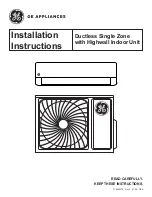
111
OCH760
9
ELECTRICAL WIRING
9-1. OVERVIEW OF POWER WIRING
This chapter provides an introduction to electrical wiring for the Power Multi series, together with notes concerning power wir
-
ing, wiring for control (transmission wires and remote controller wires), and the frequency converter.
(1)
Use a separate power supply for the outdoor unit and indoor unit.
(2)
Bear in mind ambient conditions (ambient temperature, direct sunlight, rain water, etc.) when proceeding with the wiring and connections.
(3)
The wire size is the minimum value for metal conduit wiring. The power cord size should be 1 rank thicker consideration of voltage drops.
Make sure the power-supply voltage does not drop more than 10%.
(4)
Specific wiring requirements should adhere to the wiring regulations of the region.
(5)
Power supply cords of parts of appliances for outdoor use shall not be lighter than polychloroprene sheathed flexible cord (design 60245 IEC57).
For example, use wiring such as YZW.
(6)
Install an earth line longer than power cables.
Warning:
·
Be sure to use specified wires to connect so that no external force is imparted to terminal connections. If connections are not fixed firmly,
it may cause heating or fire.
·
Be sure to use the appropriate type of overcurrent protection switch. Note that generated overcurrent may include some amount of direct
current.
Caution:
·
Some installation site may require attachment of an earth leakage breaker. If no earth leakage breaker is installed, it may cause an electric
shock.
·
Do not use anything other than breaker and fuse with correct capacity. Using fuse and wire or copper wire with too large capacity may cause a
malfunction of unit or fire.
Be sure to install N-Line. Without N-Line, it could cause damage to the unit.
·
9-2. WIRING OF MAIN POWER SUPPLY AND EQUIPMENT CAPACITY
9-2-1. Wiring diagram for main power supply
■
Schematic Drawing of Wiring : When NOT using a Branch Box (example)
3N ~ 380-400-415 V, 50 Hz
L1/L2/L3/N
A
E
L/N
E
L/N
E
L/N
E
L/N
F
A
Switch (Breakers for Wiring and Current Leakage)
B
Outdoor Unit
C
Branch Box
D
A-Control Indoor Unit
E
CITY MULTI series Indoor unit
F
Pull Box
Note: The CITY MULTI series indoor unit cannot receive power
supplied from an outdoor unit, so provide it with power
separately.
;
A
B
;
;
;
;
~ /N 220-230-240 V, 50 Hz
■
Schematic Drawing of Wiring : When using Branch Boxes (example)
D
D
D
D
L/N
S1/S2/S3
S1/S2/S3
C
L/N
S1/S2/S3
S1/S2/S3
C
D
A
L1/L2/L3/N
B
<When power is supplied to branch box from the outdoor unit>
;
;
;
;
;
;
;
;
;
;
;
3N ~380-400-415 V, 50Hz
B1/B2
S1/S2/S3
S1/S2/S3
















































